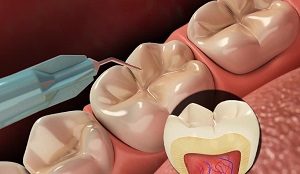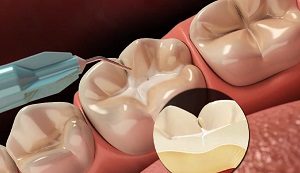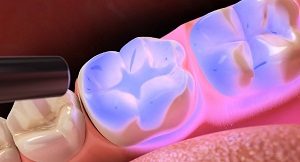Fissures are the thin grooves on the chewing surfaces and no matter how well they are brushed, bacteria can still collect within them and eventually cause decay. A fissure sealant is a safe plastic coating applied to the tooth to stop food particles and bacteria from settling in these hard-to-clean grooves.
This preventive treatment is normally given to children whose permanent teeth are starting to emerge, usually between 6 and 7 years. The application process is quick and easy, and there is no need for an anaesthetic or drilling.
Benefits
- Long lasting protection
- Painless treatment
- Invisible once applied
Treatment steps
- The tooth is polished to remove plaque and food debris from the fissure surfaces.
- The surface of the tooth is etched with a special solution.
- After rinsing off this solution and drying the tooth, the sealant is applied with a brush.
- A curing light is used so the sealant will harden and quickly bond with the surface, forming a tough coating
Aftercare
To ensure sealants offer the best protection, it is important they are used in conjunction with a comprehensive dental care routine that includes effective brushing, flossing and a healthy diet. However, treated teeth will have smoother surfaces, so they will be much easier to keep clean.
Sealants can last for many years but regular check-ups are necessary to ensure they continue to remain intact.
What are sealants?
 Sealants are a safe and painless way or protecting your children’s teeth from decay. A sealant is a protective plastic coating, which is applied to the biting surfaces of the back teeth. The sealant forms a hard shield that keeps food and bacteria from getting into the tiny grooves in the teeth and causing decay.
Sealants are a safe and painless way or protecting your children’s teeth from decay. A sealant is a protective plastic coating, which is applied to the biting surfaces of the back teeth. The sealant forms a hard shield that keeps food and bacteria from getting into the tiny grooves in the teeth and causing decay.
Which teeth should be sealed?
Sealants are only applied to the back teeth – the molars and premolars. These are the teeth that have pits and fissures on their biting surfaces. Your dentist will tell you which teeth should be sealed after they have examined them, and checked whether the fissures are deep enough for sealing to help. Some teeth naturally form with deep grooves, which will need to be sealed, others with shallow ones which will not need sealing.
What is involved?
The process is usually quick and straightforward taking only a few minutes per tooth. The tooth is thoroughly cleaned, prepared with a special solution, and dried. The liquid sealant is then applied and allowed to set hard – usually by shining an ultraviolet light onto it.
Will my child feel it?
No, it is totally pain free, and the teeth do not feel any different afterwards.
How long do they last?
Sealants usually last for many years, but your dentist will want to check them regularly to make sure that the seal is still intact. They can wear over time, and sometimes the dentist needs to add or replace some sealant to be sure that no decay can start underneath them.
How do they work?
The sealant forms a smooth, protective barrier, by covering all the little grooves and dips in the surface of the tooth. Dental decay easily starts in these grooves.
When should this be done?
Sealants are often applied as soon as the permanent teeth start to come through. This is usually between 6 and 7 years of age. The rest are usually sealed as soon as they appear which can be any time between 11 and 14 years of age.
usually between 6 and 7 years of age. The rest are usually sealed as soon as they appear which can be any time between 11 and 14 years of age.
How much does it cost?
Most dentists offer fissure sealing. It may be available on the NHS and is not expensive.  But in many cases it is available only privately. The cost varies from dentist to dentist, but it is usually good value.
But in many cases it is available only privately. The cost varies from dentist to dentist, but it is usually good value.
Do my children still have to clean their teeth?
Yes. It is still vital that they do this. The smooth, sealed surface is now much easier to keep clean and healthy with normal toothbrushing. Using a fluoride toothpaste will also help to protect your children’s teeth. Pit and fissure sealing reduces tooth decay and the number of fillings your child might need.
Whom do I ask about the treatment?
If you would like to know more about the treatment, ask your dentist or hygienist. They will tell you if fissure sealing will help your children’s teeth, and if it is the right time to do it.
